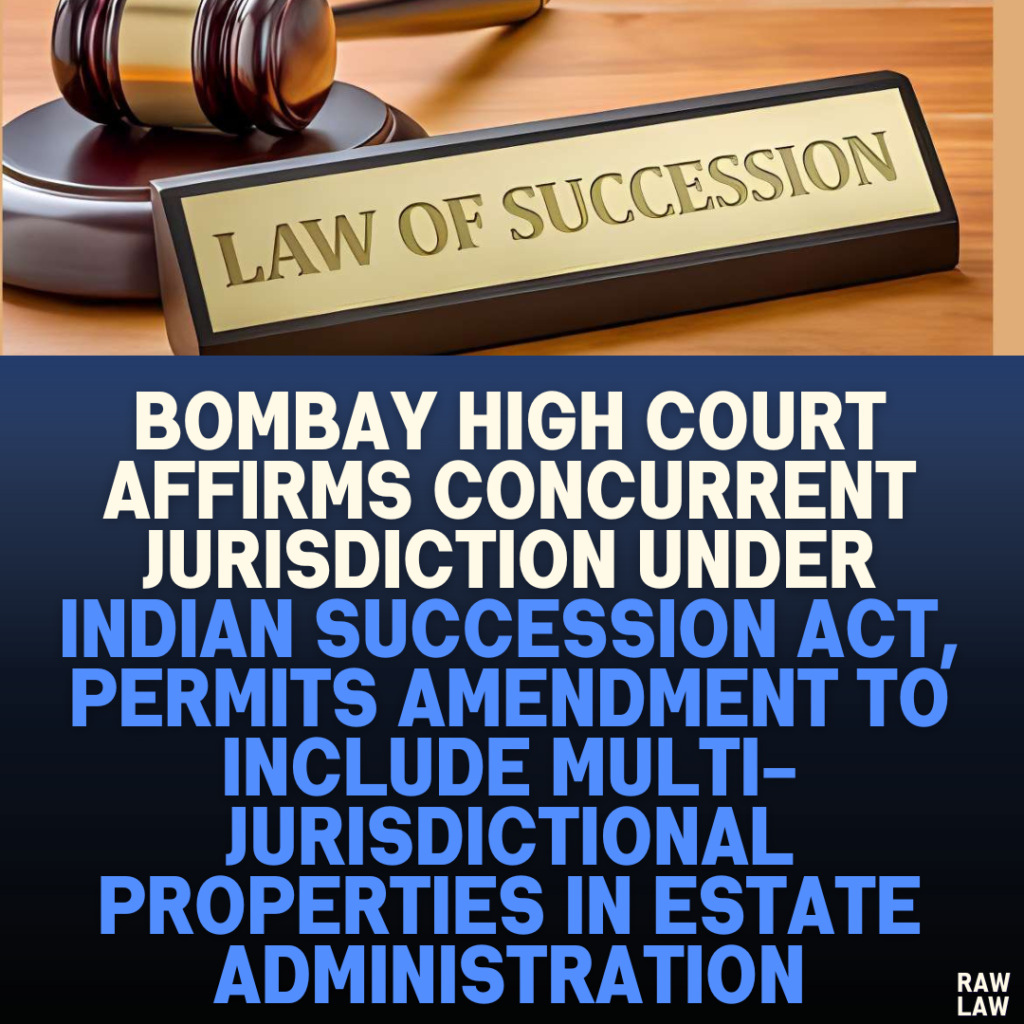Court’s Decision
The Bombay High Court allowed an amendment to the petition for Letters of Administration, enabling the inclusion of additional properties across Maharashtra and other states, emphasizing that such an amendment ensures comprehensive administration of the deceased’s estate. The court upheld that it has concurrent jurisdiction under Section 300 of the Indian Succession Act, 1925, and can entertain the petition despite objections on territorial jurisdiction grounds.
Facts
The petitioner initially sought Letters of Administration for the estate of the deceased, who passed away in Pune. The original petition included only a property located in Pune. Upon later discovery of additional assets across Maharashtra, Delhi, West Bengal, Gujarat, Madhya Pradesh, and internationally, the petitioner filed an amendment application to update the estate’s property schedule, aiming for a full representation of the deceased’s assets.
Issues
- Whether the Bombay High Court has jurisdiction to entertain the petition when the deceased primarily resided and had a property in Pune.
- Whether the petition for amendment to include properties outside the court’s territorial jurisdiction should be allowed.
Petitioner’s Arguments
The petitioner argued that:
- The Bombay High Court has concurrent jurisdiction over estate matters as authorized under Section 300 of the Indian Succession Act.
- Including all known properties in the petition ensures that no assets of the deceased remain unadministered and allows a comprehensive settlement.
- The amendment is formal and does not alter the petition’s nature or prejudice the respondent.
Respondent’s Arguments
The respondent, representing an opposing trust, contended that:
- The High Court lacks jurisdiction since the deceased resided and had primary assets in Pune.
- The petition to amend the original application was an attempt to “cure” jurisdictional defects to confer Bombay jurisdiction improperly.
- The inclusion of out-of-state and international properties should necessitate filing in the appropriate jurisdiction, emphasizing the deceased’s testamentary action in Pune.
Analysis of the Law
The court examined the scope of Sections 273 and 300 of the Indian Succession Act:
- Section 273 provides that probate or letters granted by a High Court extend state-wide and, in specific cases, nationwide, while District Judges’ orders are limited by a Rs. 10,000 property value threshold for estates outside their jurisdiction.
- Section 300 affirms concurrent jurisdiction for High Courts and District Judges, enabling the High Court to issue orders applicable beyond its ordinary civil jurisdiction under specific conditions.
Precedent Analysis
The court referenced past cases, including decisions from the Calcutta and Madhya Pradesh High Courts, supporting High Courts’ authority in testamentary matters extending beyond immediate jurisdiction under specific conditions.
Court’s Reasoning
The court reasoned that:
- The High Court’s concurrent jurisdiction allows it to include the newly identified properties within its oversight.
- Section 300, as interpreted in past cases, does not restrict the High Court’s authority to entertain petitions involving multi-jurisdictional properties when no conflicting legislative provisions exist.
- Allowing the amendment aligns with judicial intent, as no part of the estate should be excluded from administration.
Conclusion
The Bombay High Court granted the petitioner’s application for amendment, affirming its jurisdiction to hear and adjudicate matters involving properties beyond its immediate territorial limits.
Implications
This ruling underscores the High Court’s expansive role in estate matters under Indian succession laws, reinforcing judicial jurisdiction in multi-state or cross-border asset cases within India’s legal framework. The decision may encourage future petitions involving complex estates to seek High Court administration when properties span multiple jurisdictions.
